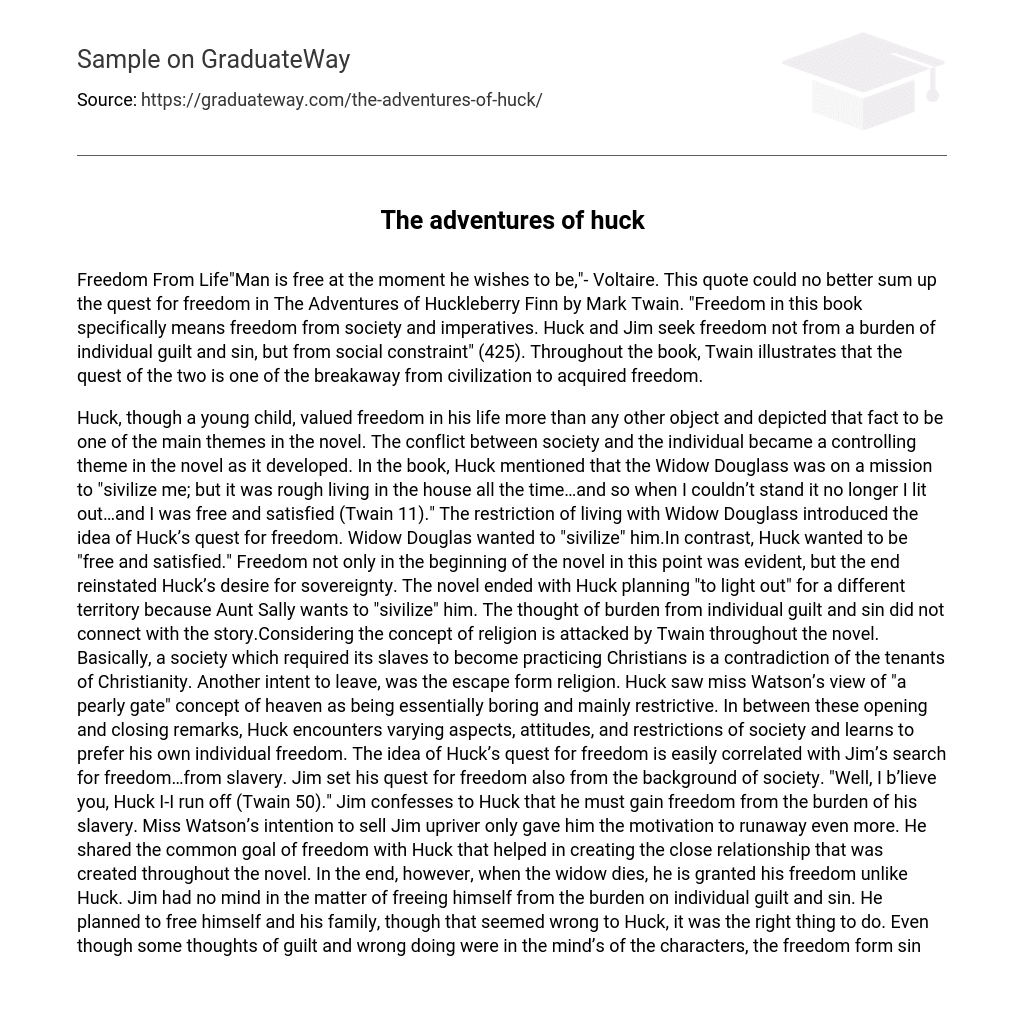Voltaire once said, “Man is free at the moment he wishes to be.” This quote perfectly captures the theme of freedom in The Adventures of Huckleberry Finn by Mark Twain. In this novel, freedom refers to liberation from societal norms and expectations. Both Huck and Jim desire to escape not only personal guilt and sin but also the restrictions imposed by society. Mark Twain skillfully demonstrates throughout the book that their journey is a quest for freedom from civilization in order to attain true liberation.
Huck, despite being a young child, placed great importance on freedom in his life, which he portrayed as a central theme in the novel. As the story progressed, the conflict between societal norms and individuality emerged as a prevailing theme. Within the book, Huck mentions that the Widow Douglass aimed to “civilize” him; however, living in her house proved challenging. Consequently, when he could no longer tolerate it, he decided to leave and experience a sense of freedom and contentment (Twain 11).
Living with Widow Douglass imposed restrictions on Huck and sparked his desire for freedom. Widow Douglas sought to civilize him, while Huck longed to be free and content. His quest for freedom is prevalent both at the start and the conclusion of the novel, reaffirming his longing for independence.
The conclusion of the novel depicted Huck’s decision to escape to a new territory due to Aunt Sally’s desire to “civilize” him. The notion of personal guilt and sin did not resonate with the narrative. Twain continuously challenges the concept of religion in the novel. The idea of requiring enslaved individuals to embrace Christianity contradicts the principles of the religion itself. Another reason to leave was to escape from the confines of religion. Huck found Miss Watson’s perspective on heaven, depicted as a mundane and restrictive “pearly gate,” uninteresting.
Between the opening and closing remarks, Huck experiences different aspects, attitudes, and limitations of society and develops a preference for his own personal freedom. The concept of Huck’s pursuit of freedom can be easily connected to Jim’s search for freedom as well…from slavery. Jim also embarked on his quest for freedom against the backdrop of society. “Well, I believe you, Huck I-I ran off (Twain 50).”
Jim reveals to Huck that he desires to break free from his enslavement, which is a heavy burden. When Miss Watson plans to sell Jim further up the river, it only strengthens his determination to escape. The shared aspiration for freedom binds Huck and Jim together, fostering a deep bond that develops over the course of the novel.
Despite Huck not being granted his freedom like Jim when the widow dies, he realizes that freeing himself from the burden of individual guilt and sin is not the most important thing. Jim, on the other hand, plans to free himself and his family, which Huck initially thinks is wrong but later understands it’s the right thing to do. Although guilt and thoughts of wrongdoing are present in the characters’ minds, the main focus is on freedom from sin and individual guilt. Huck does experience guilt for assisting Jim in seeking freedom, but this feeling quickly fades when he realizes that helping Jim is actually a virtuous act.
Twain’s portrayal of slavery and the religious beliefs of southerners in the book is contradictory and absurd. The characters surrounding Huck and Jim represent the desire for individual forgiveness and freedom from guilt and sin. Huck and Jim achieve freedom when they truly desire it.





